MAECI
#Insieme per gli SDG
È la campagna promossa dal Ministero degli Affari Esteri e della Cooperazione Internazionale con i partner FAO, Commissione Europea, SDG Action Campaign delle Nazioni Unite, CIHEAM Iamb di Bari e Save the Children per sensibilizzare l’opinione pubblica sugli Obiettivi di Sviluppo Sostenibile delle Nazioni Unite (gli SDG) e sul lavoro della Cooperazione Italiana e dei suoi partner per raggiungere tali obiettivi nel mondo post Covid19.
#InsiemepergliSDG ha celebrato nel 2020 e 2021 la GMA con iniziative e attività nelle città di Bari, Roma, Prato, Teramo e Cremona. Parte integrante della campagna le due installazioni itineranti interattive #2030IsNow e #SDGInAction per illustrare in maniera innovativa i 17 Obiettivi di sviluppo sostenibile (Sustainable Development Goals, SDG) e le attività didattiche di coinvolgimento di bambine, bambini, adolescenti e scuole. Save the Children ha curato la promozione dell’iniziativa presso le scuole.
https://www.youtube.com/watch?v=ve-uswpZbYU PRATO
https://www.youtube.com/watch?v=ntw9ZPQYIUs TERAMO
https://youtu.be/ExJP0jVTcMM CREMONA
FAO
Libro di attività - “Non lasciare nessuno indietro. Una produzione migliore, una nutrizione migliore, un ambiente migliore e una vita migliore.”
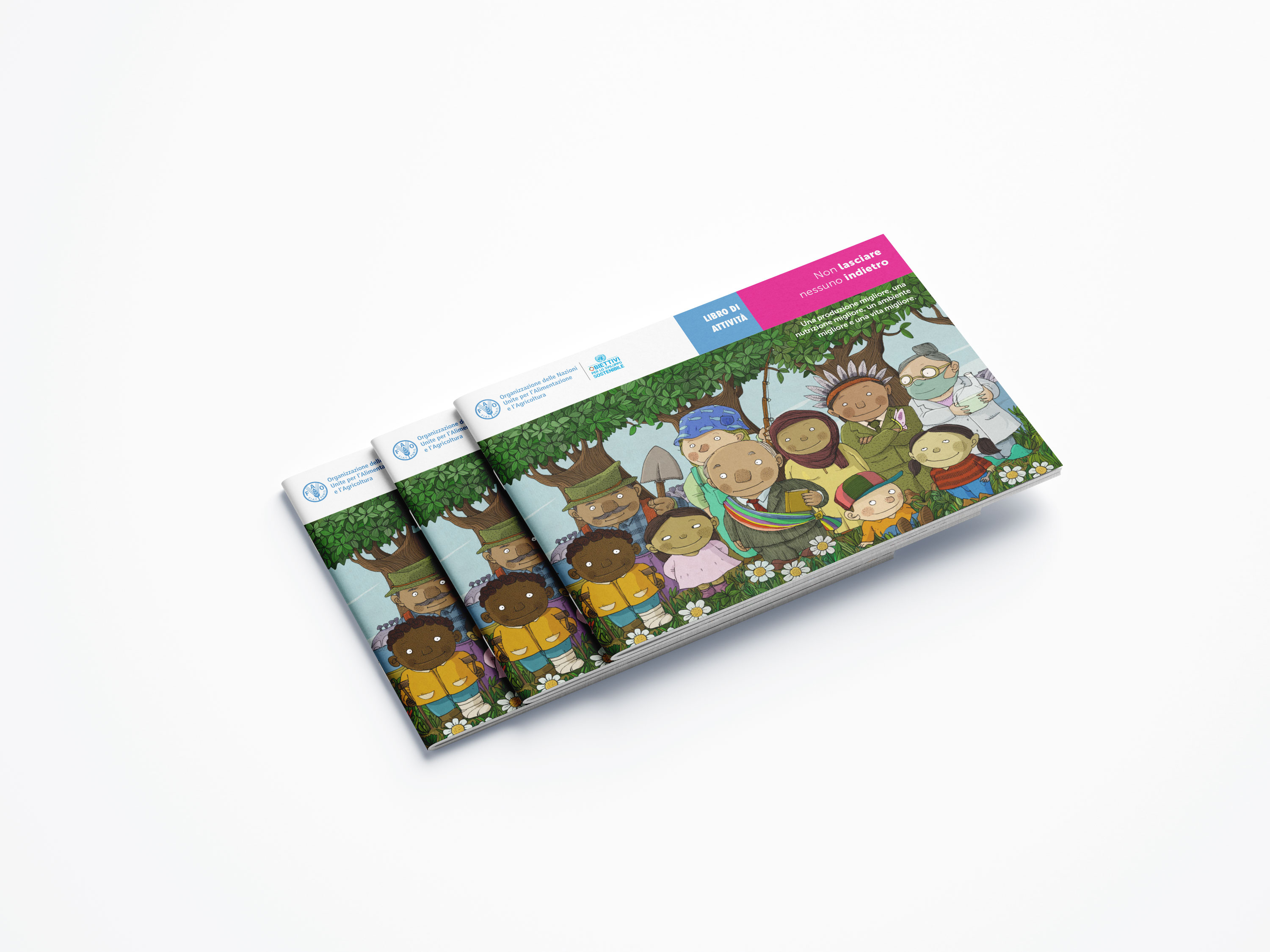
Libro di italiano
Siamo tutti connessi! Dal nostro cibo alle nostre culture, dall’ambiente alle economie, viviamo in un mondo globalizzato. Spesso il cambiamento climatico, le guerre e le disuguaglianze possono far sì che gruppi di persone restino indietro per diversi motivi, ad esempio la loro posizione geografica. Creare un futuro migliore e più sostenibile per tutti significa che non può essere lasciato nessuno indietro. Scopri come puoi passare all’azione e partecipare al cambiamento con il Libro di Attività della Giornata Mondiale dell’Alimentazione
Libro in altre lingue
Arabo
Cinese
Francese
Inglese
Spagnolo
Russo
Edizioni precedenti
Libro di attività - Le nostre azioni sono il nostro futuro. Una produzione migliore, una nutrizione migliore, un ambiente migliore e una vita migliore

Libro in altre lingue
Arabo
Cinese
Francese
Inglese
Spagnolo
Russo
Portoghese
Eroi dell’alimentazione – Libro delle Attività sulla Giornata Mondiale dell’alimentazione 2020
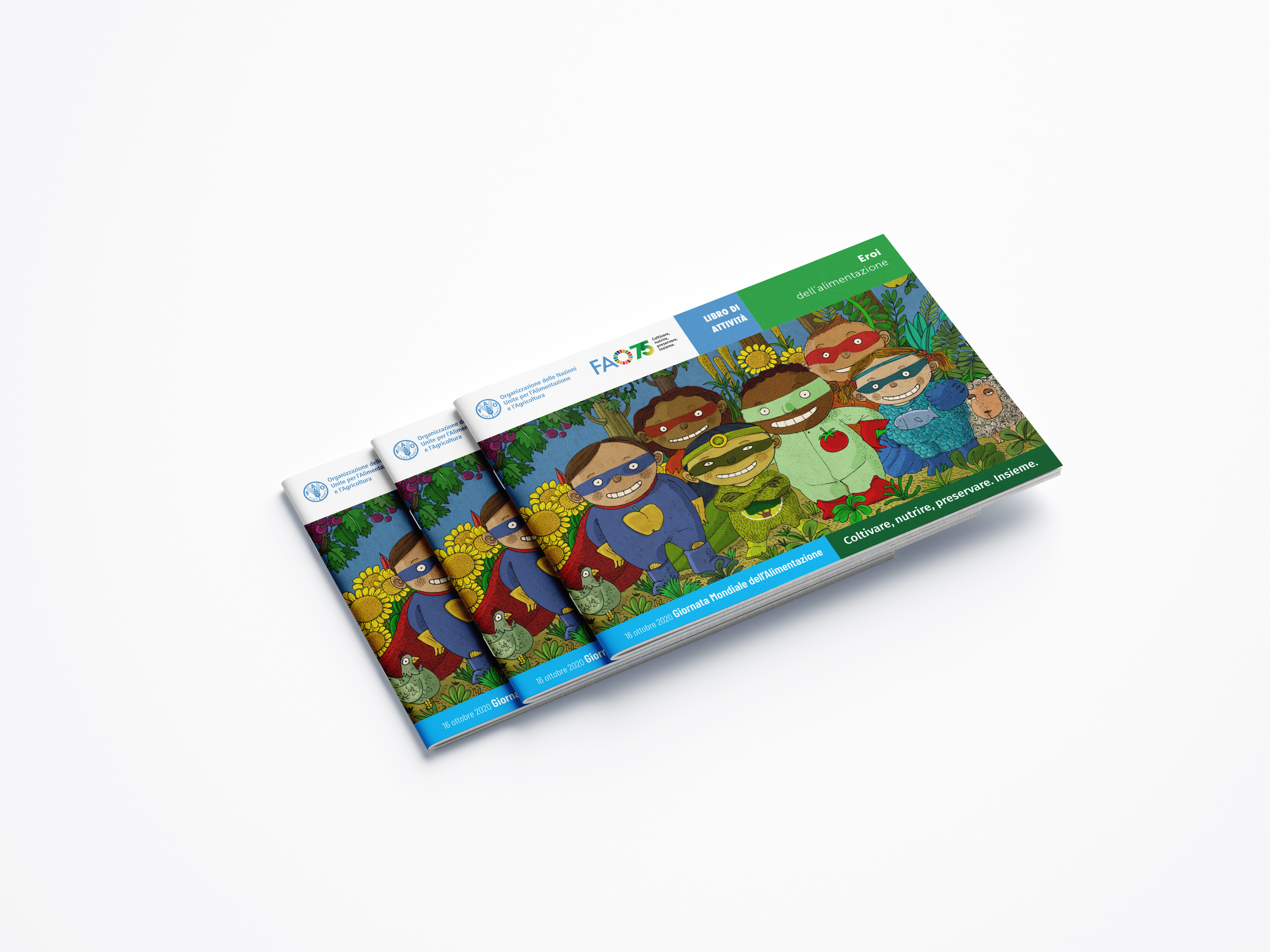
Libro in altre lingue
Arabo
Cinese
Francese
Inglese
Spagnolo
Russo
Portoghese
Lavoriamo per Fame Zero - Libro di Attività sulla Giornata Mondiale dell’Alimentazione 2018
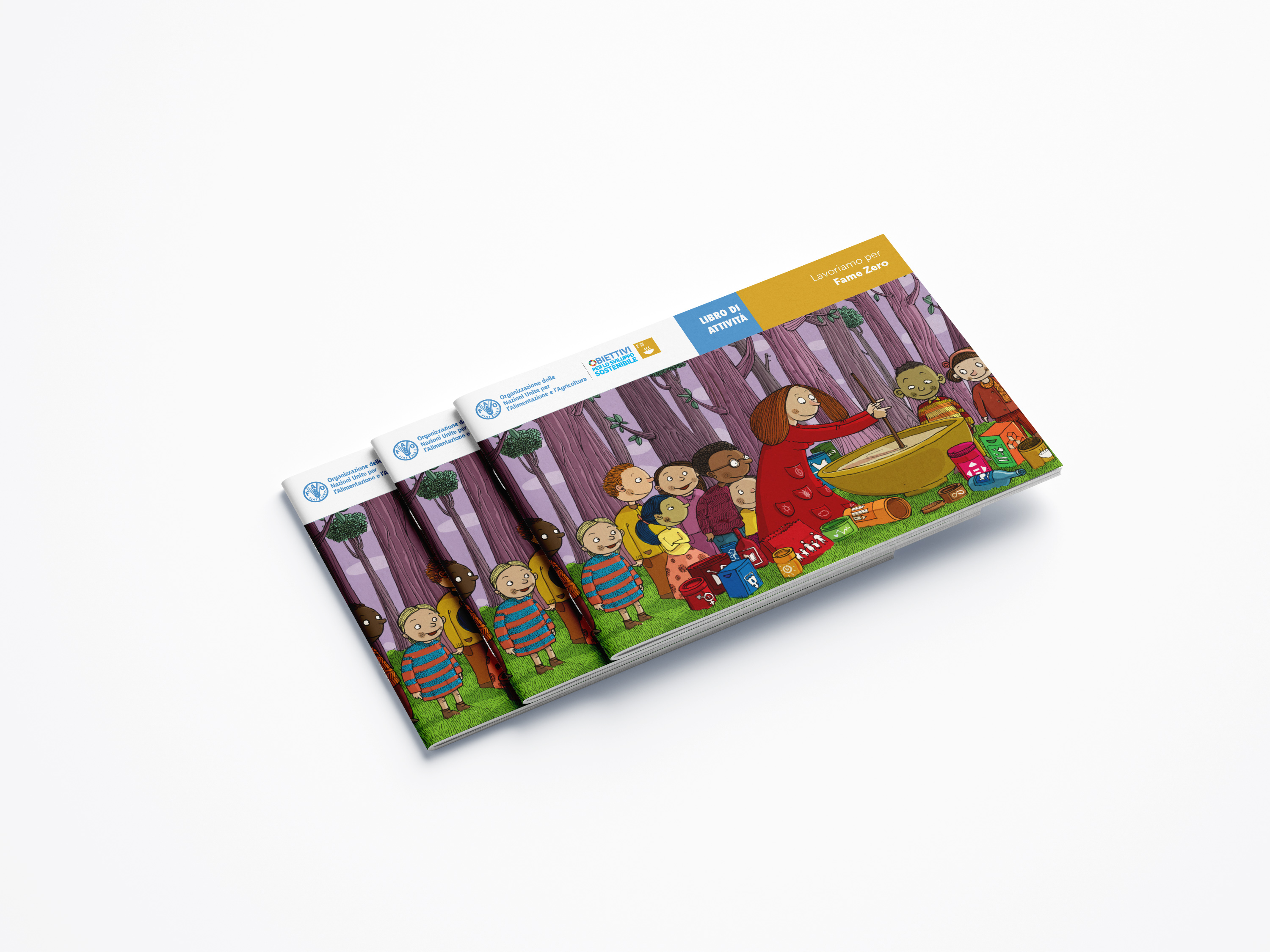
Libro in altre lingue
Arabo
Cinese
Francese
Inglese
Spagnolo
Russo
Il clima sta cambiando. L’alimentazione e l’agricoltura anche - Libro di attività
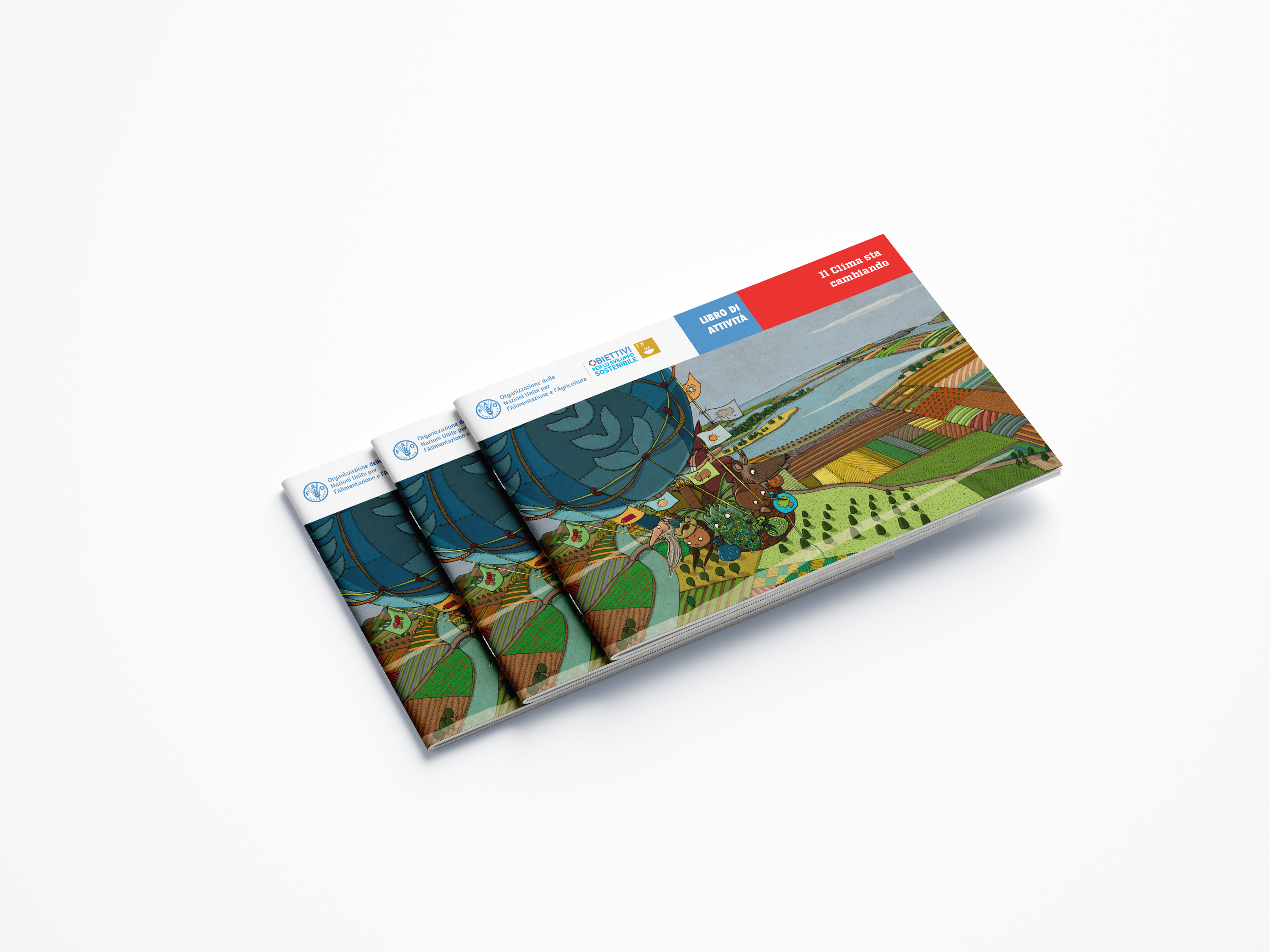
Libro in altre lingue
Arabo
Cinese
Francese
Inglese
Spagnolo
Russo
Cambiamo il futuro delle migrazioni - Libro di attività

Libro in altre lingue
Arabo
Cinese
Francese
Inglese
Spagnolo
Russo
Piante sane per un paese sano - Libro di attività
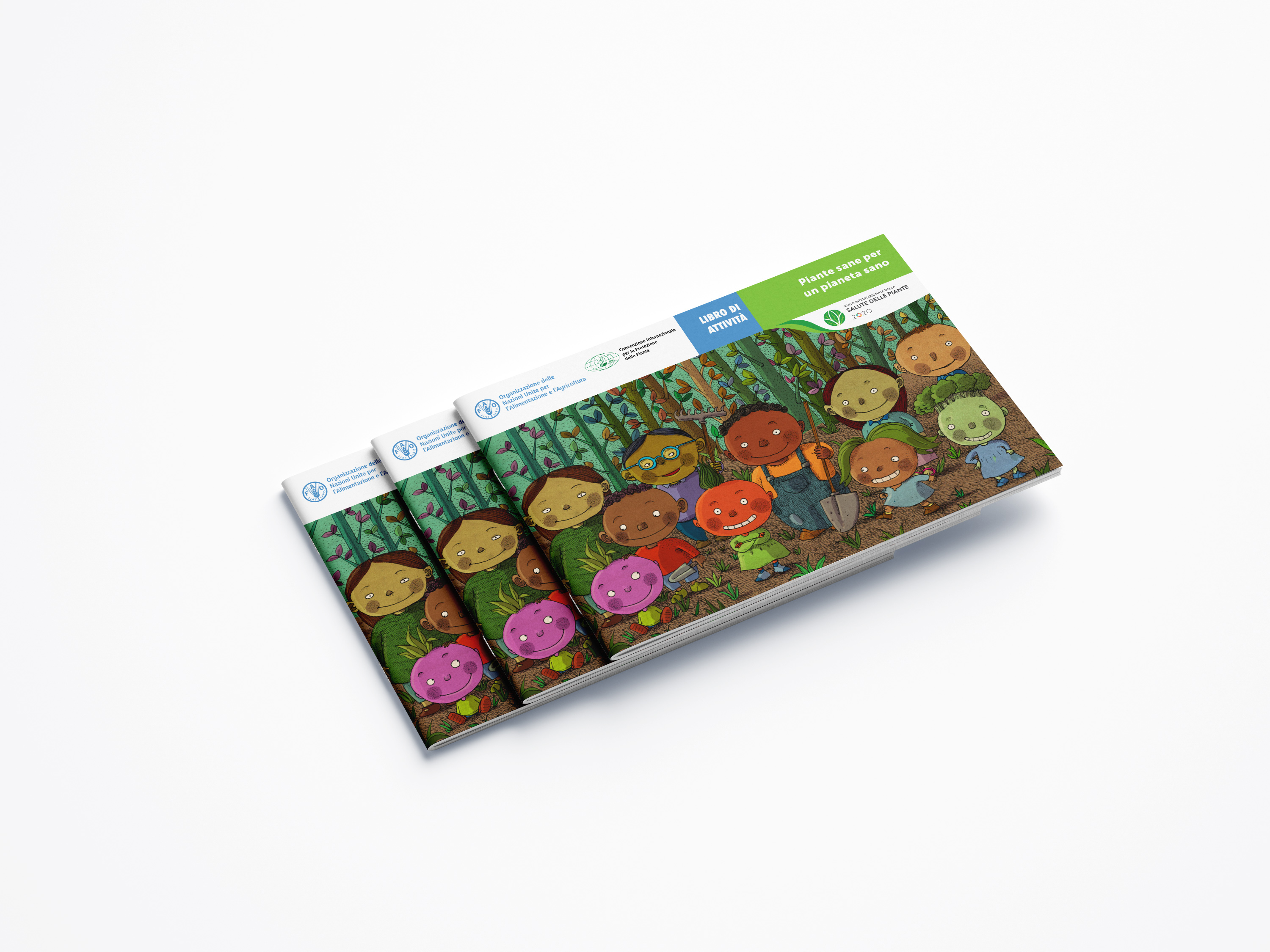
Libro in altre lingue
Arabo
Cinese
Francese
Inglese
Spagnolo
Russo
La tua guida alla FAQ - Libro di attività
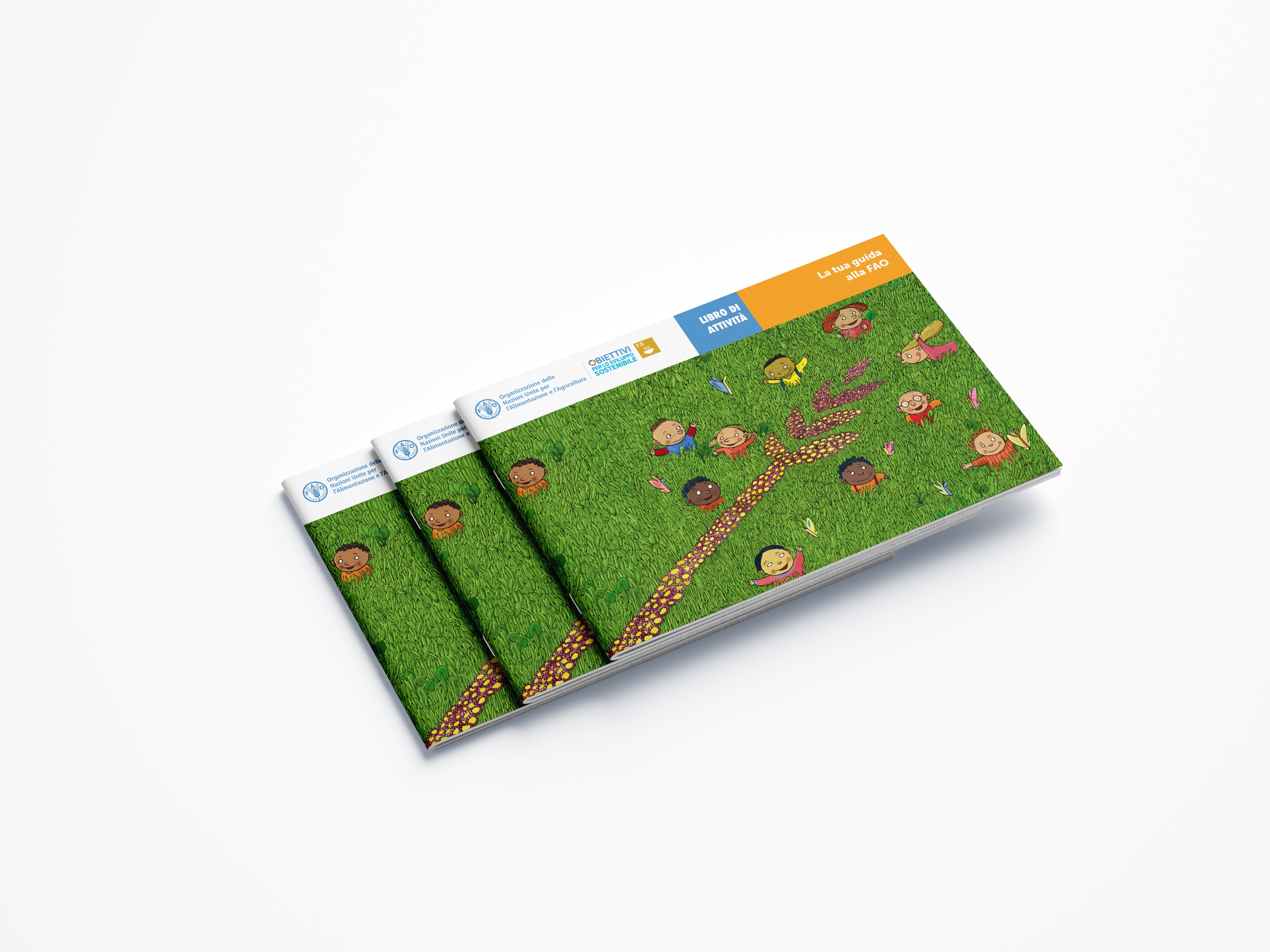
Libro in altre lingue
Arabo
Cinese
Francese
Inglese
Spagnolo
Russo
IFAD
- The Agri-Business Capital Fund (ABC Fund): The Agri-Business Capital Fund (ABC Fund) (ifad.org)
The Agri-Business Capital Fund (ABC Fund) invests in smallholder farmers and rural small and medium-sized enterprises (SMEs) in developing countries to support sustainable and inclusive agricultural value chains. The ultimate aim is to help reduce rural poverty, feed the planet and build food systems resilient to climate change.
More information about the ABC Fund - Agroecology: a holistic path towards sustainable food systems: Agroecology: a holistic path towards sustainable food systems (ifad.org)
Agroecology applies ecological principles to agriculture and ensures a regenerative use of natural resources and ecosystem services, while addressing the need for socially equitable food systems in which people can choose what they eat and how it is produced. This product is part of a broader joint IFAD-FAO collaboration, financed by the second phase of IFAD’s Adaptation for Smallholder Agriculture Programme (ASAP2). - ASAP Technical Series: Nature-based solutions: ASAP Technical Series: Nature-based solutions (ifad.org)
The nature-based solutions (NbS) concept emerged during the United Nations Framework Convention on Climate Change fifteenth session of the Conference of the Parties (COP 15) in 2009. This paper presents key results and lessons learned on NbS, mainly from IFAD’s Adaptation for Smallholder Agriculture Programme (ASAP) portfolio, to inspire future programmes to reach greater scale in supporting inclusive rural transformation. - IFAD and Slow Food: The IFAD and Slow Food Case for Investment
IFAD and Slow Food share a vision of supporting small-scale, diversified production and consumption mechanisms that focus on improving the marketing of local products. Such mechanisms reflect principles of quality, biodiversity and environmental conservation. They also guarantee the fair pricing of agricultural products that adequately compensates the work of smallholder families. - 2021 at a glance: 2021 at a glance (ifad.org)
This infographic presents highlights of IFAD’s work in 2021.
Learn about our involvement in major global initiatives to transform food systems and address climate change, and see how lessons from our work are informing global responses to these issues. You can also read what rural people are saying about the challenges they are facing and how IFAD’s work is affecting their lives. - Climate Action Report 2020: Climate Action Report 2020 (ifad.org)
This third edition of the IFAD Climate Action Report (CAR) describes the efforts that IFAD has made during the year to integrate climate change into every aspect of its plans and operations. - IFAD Strategy on Biodiversity 2022-2025: IFAD Strategy on Biodiversity 2022-2025
The purpose of this strategy is to facilitate a more systematic, organized and generalized integration of the protection, sustainable use and promotion of biodiversity in IFAD operations - IFAD Action Plan Nutrition 2019-2025: IFAD Action Plan Nutrition 2019-2025
This Nutrition Action Plan (NAP) 2019 2025 sets out the framework to guide IFAD’s actions to accelerate mainstreaming of nutrition into its investments. It has been developed in a highly participatory and consultative manner, involving IFAD staff (at headquarters and IFAD country offices/hubs), as well as key partners and IFAD Executive Board representatives. Building on achievements and lessons learned from IFAD’s first Nutrition Action Plan (2016 2018), this NAP deepens IFAD’s commitments to nutrition mainstreaming while leveraging the organization’s comparative advantage. - Rural Development Report 2021Rural Development Report 2021 - Transforming food systems for rural prosperity: - Transforming food systems for rural prosperity: Rural Development Report 2021 (ifad.org)
The transformation of food systems is a burning topic across the globe, in response to concerns about the nutritional, environmental and equity impacts of our current system. Food system transformation is inextricably linked with efforts to eradicate hunger and poverty, since the livelihoods of a large share of the world’s poor people are based upon such systems and we cannot afford to leave rural people behind…
FILMATI IFAD IN INGLESE
- The Climate Nutrition Nexus - Linkages and Implications: The Climate Nutrition Nexus - Linkages and Implications. - YouTube
This fascinating whiteboard video shows how Nutrition and Climate are interlinked. Hear about the story of Jane a 25 year old farmer from Zimbabwe, and how the changing climate impacts African women like her and her family. From not being able to produce enough nutritious food to eat, through to dealing with droughts and floods caused by the changing climate. Find out how Jane, organizations and governments can help families like Jane improve their livelihoods and adapt to the changing climate - India: Nutrition through innovation: India: Nutrition through innovation - YouTube
42% of children under five in Madhya Pradesh, India, are malnourished. To change cooking and eating habits, IFAD and the Government had to get creative and find innovative ways to increase the consumption of vegetables and more balanced meals - Jordan: Leaving No One Behind: Jordan: Leaving No One Behind - YouTube
Zaatari refugee camp in Jordan was once a rural town of 12,000 inhabitants. It is now home to at least 120,000 refugees - most of whom have fled the conflict in Syria. This sudden increase in population created competition for already limited resources. But investments in agricultural production and access to microfinance loans have given host communities and refugees opportunities to run their own businesses and feed their families. - KENYA - Goodwill Ambassador Sabrina Elba visits IFAD projects: KENYA - Goodwill Ambassador Sabrina Elba visits IFAD projects. - YouTube
In May 2022 IFAD Goodwill Ambassador Sabrina Elba travelled to Kenya in her first solo mission to see the work IFAD is funding is helping farmers and producers adapt to the changing climate. - SRI LANKA Carlo Cracco finds out how jackfruit could hold the key to tackling climate change: SRI LANKA Carlo Cracco finds out how jackfruit could hold the key to tackling climate change - YouTube
Could jackfruit help rural peoples in Sri Lanka adapt to climate change? Carlo Cracco, one of Italy’s most famous chefs, thinks so. - Climate Change: An alarm we can no longer ignore: Climate Change: An alarm we can no longer ignore - YouTube
It’s time to wake up. We can no longer ignore the alarm bells. Some 3.4 billion rural people who are highly vulnerable to climate change rely on the world taking action. - Indonesia- How one project in Indonesia is restoring Peatlands to help tackle climate change: Indonesia- How one project in Indonesia is restoring Peatlands to help tackle climate change - YouTube
Peatlands are the superheroes of ecosystems. Purifying water, mitigating flooding and providing homes for rare species. Covering 3% of land Peatlands store twice as much carbon as forests. But deforestation and fires have turned them from carbon sinks to carbon sources. Learn how the SMPEI project in Indonesia is hoping to reverse that trend. - Senegal tackling climate change- Saving the country's mangrove forests: Senegal tackling climate change- Saving the country's mangrove forests. - YouTube
Thousands of hectares of restored Mangroves are changing the lives of local fishing communities in Senegal and helping them tackle climate change. Mangroves are essential for preventing soil erosion, holding back rising sea levels and promoting marine ecosystems but in the last 25 years Africa has lost nearly 500,000 hectares of its mangroves due to drought, deforestation and construction. In Senegal one local project is investing in mangrove reforestation and local communities to to save local villages and to help them adapt to the changing climate. - ETHIOPIA The Gully Gang- the young men rebuilding and adapting to climate change: ETHIOPIA The Gully Gang- the young men rebuilding and adapting to climate change. - YouTube
In the highlands of Ethiopia, fifty young men are working hard to reverse the effects of climate change. They are rebuilding and protecting gullies. In this region gullies are used to channel the seasonal rain water into managed irrigation, but heavier and persistent rains have led to their erosion. - KENYA Food from the Forest: KENYA Food from the Forest - YouTube
Farmers in Kenya are working to protect nature to improve their livelihoods and reduce the impact of climate change. In the Upper Tana region, the regeneration of a large forest has given farmers a new role and source of income. - EL SALVADOR -Investing in rural youth in El Salvador to tackle migration and enhance food security: EL SALVADOR -Investing in rural youth in El Salvador to tackle migration and enhance food security - YouTube
For some years, IFAD-funded projects in El Salvador have focused their activities in allowing rural youth to stay on their communities and make a living out of agriculture, preventing them from migrating to the city or abroad, mainly to the United States. Funded by the UN’s International Fund for Agricultural Development (IFAD) and the Government of El Salvador, the currently running Rural Adelante Project insists in that direction and it’s giving young people a new interest in agriculture. - RDR REPORT - PAKISTAN - Animals are more than just food: RDR REPORT - PAKISTAN - Animals are more than just food. - YouTube
IFAD's Rural Development Rural Report- Seeking synergies – in animal production systems and animal-sourced foods. Cutting down on eating animal sourced food has been a popular topic for debate in recent years. But while those in the developing world may be overusing them, those in the developing world are not using them enough. Animal Sourced Foods Animals mean more to rural people than just food. They are part of livelihoods – in many different ways – providing social status, power for land preparation and agricultural tasks and providing a source of food and income. As a store of wealth and capital, they serve as a buffer stock for bad times...
WFP
- The global goals for sustainable development, WFP
I Global Goals – ossia gli Obiettivi di Sviluppo Sostenibile (Sustainable Development Goals) – sono i 17 obiettivi di un grande piano d’azione del 2015, su cui i governi dei 193 Paesi membri dell’ONU si sono accordati. I Paesi si impegnano a raggiungere questi Obiettivi entro il 2030 - Fame Zero
Il World Food Programme assiste i più vulnerabili raggiungendo 80 milioni di persone in 80 paesi con cibo salvavita - Alimentazione scolastica
È la terra che sostiene le nostre vite. Diamo vita a un nuovo futuro per il mondo
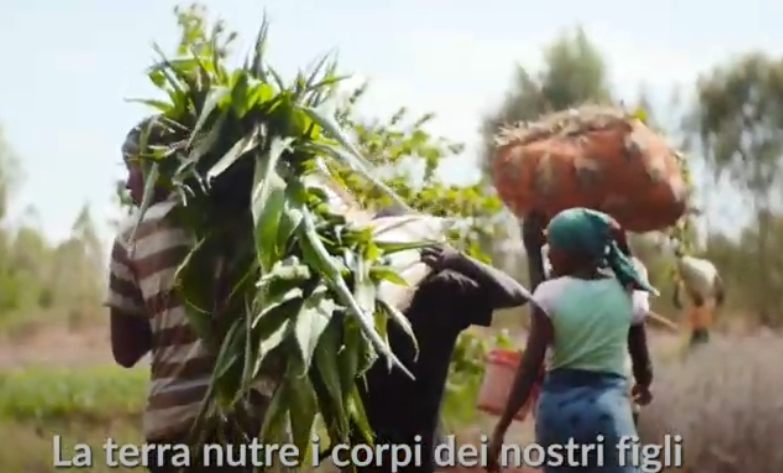
- #FameZero
Il WFP in azione, Ain't no mountain enough! - L’assistenza alimentare, un passo verso la pace e la stabilità
- 2022, l’anno dai bisogni umanitari senza precedenti e della crisi alimentare globale. Ma cosa significano?
- Crisi climatica e fame
- Rapporto Annuale WFP, 2021
BIOVERSITY INTERNATIONAL
- Fonda anche tu la tua BANCA dei SEMI!
Cent’anni fa, negli Stati Uniti esistevano 7.000 varietà di mele. Oggi solo 100! Come possiamo proteggere la biodiversità, per continuare a coltivare tanti alberi e ortaggi tutti diversi? - Cruciverba della biodiversità
- Formare i formatori - La biodiversità agraria nelle scuole
- Future Seeds Playlist video
- Ten key facts about Future Seeds
- Future Seeds is more than a repository for some of the world’s most important crops